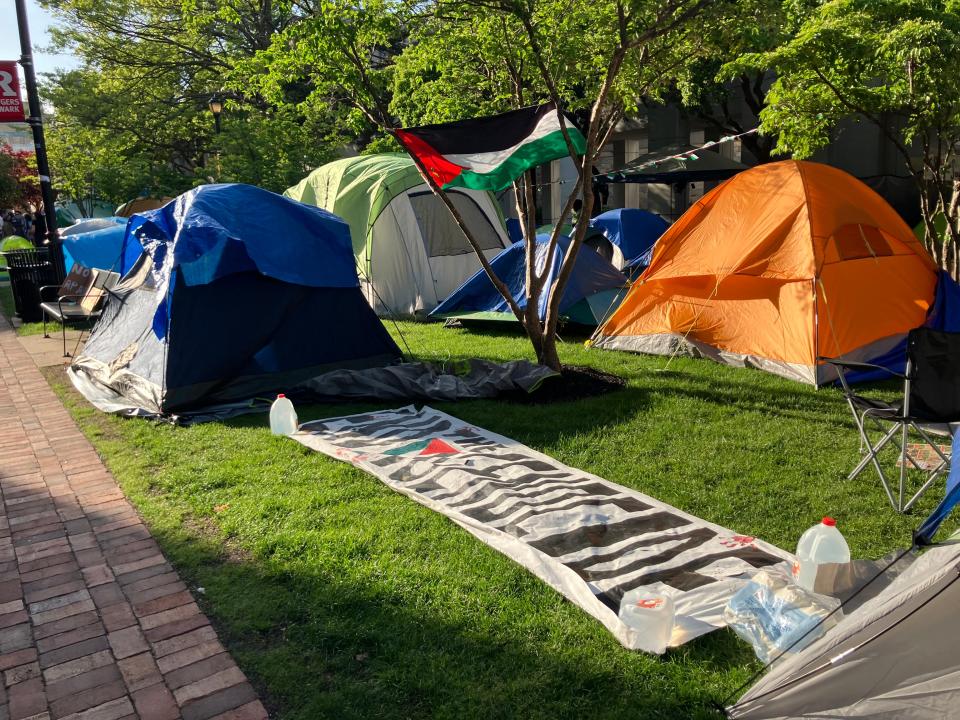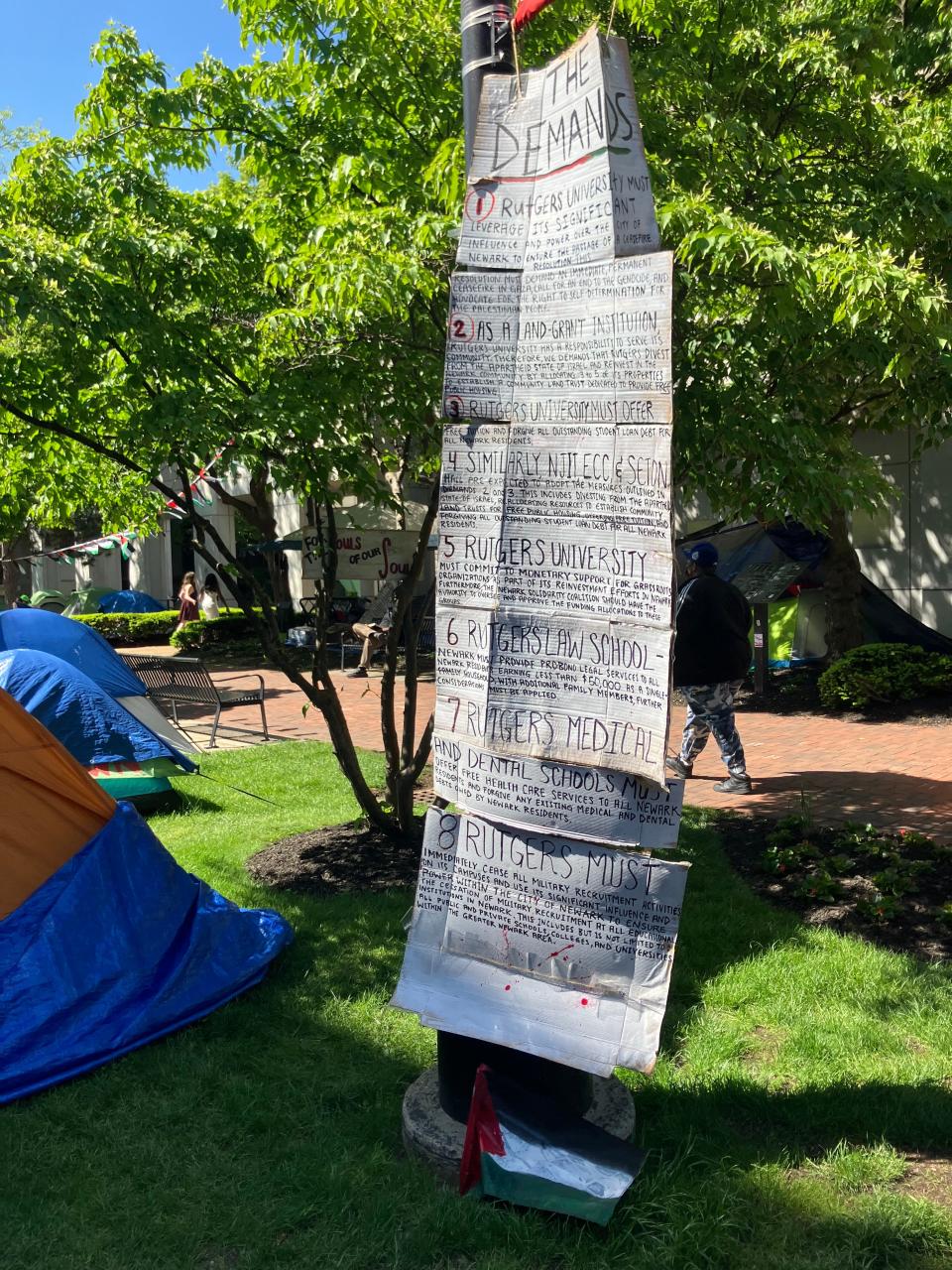Rutgers-Newark protest leaders will stay 'as long as it takes.' What they're waiting for
Nearly two weeks after students at Rutgers University's New Brunswick campus took down their Gaza Solidarity Encampment, their peers in Newark continue to organize with their own encampment and demands.
About two dozen tents dot the lawn outside the Rutgers Center for Law and Justice on the Newark campus. Teach-ins, rallies, open-mic gatherings and planning meetings fill their days. The protesters, who launched their encampment May 1, plan to stay until Rutgers agrees to divest from companies tied to Israel's war in Gaza, among other demands, organizers said.
In many ways, the scene at Rutgers is like other encampments that have sprung up on college campuses across the United States. Signs hang on benches and light poles with slogans like “Cease-fire now” and “No Cops.” There are larger tents with food donations, a “people’s library,” medical supplies and places to plug in electronics. Designated safety marshals in blue vests patrol the perimeters.

But their list of demands is more expansive and reflective of the urban community in which they are based. They are calling for the university to divest from companies and institutions tied to Israel’s war in Gaza, especially from weapons manufacturers, and to reinvest funds in ways that benefit the people of Newark. They also want the university to sever its relationship with Tel Aviv University, alleging the school has ties to the Israeli military.
The Newark Solidarity Coalition, made up of students and community members, has called for Rutgers to fund projects including: expand or provide services to the community through the university's medical, dental and legal schools; support local grassroots organizations; dedicate three to five properties for development of affordable housing; offer free tuition and loan forgiveness to Newark residents; and establish community land trusts for free public housing.
Rutgers-Newark Senior Vice Chancellor Peter Englot said the university's highest priority is the safety of students, faculty and staff.
"The protest on our campus remains peaceful," he said when asked about the protesters' demands. "As an anchor institution in Newark and committed collaborator with many community partners, Rutgers-Newark is earnestly engaging in dialogue with the protesters over the concerns they’ve expressed."
Tensions on campus
Encampments have sprung up on campuses across the United States in response to Israel's ongoing military campaign in Gaza. The recent violence began Oct. 7, when Hamas attacked Israel, killing 1,200 people and taking 240 hostages. In the aftermath, more than 35,000 Palestinians in Gaza have been killed and thousands more are missing as airstrikes turn much of Gaza to rubble.
The protests have sparked tensions on campuses. Some Jewish students say they have felt unsafe or unwelcome amid protests and anti-Israel rhetoric. Pro-Palestinian students say they also have felt unsafe as they faced riot police and counterprotests.
Newark has not attracted groups of counterprotesters that have been seen on other campuses, including at Rutgers-New Brunswick, although some individuals have expressed opposition, organizers said.

They include a 31-year-old Rutgers Law School student who was arrested May 2 and charged with disorderly conduct "related to actions taken while counterprotesting on a protest site on the Rutgers-Newark campus," Englot said.
Students said the man tore down their posters and clashed with police. His lawyer, Cory Rothbort, said Rutgers police violated his First Amendment rights by arresting his client because he put up his own posters denouncing Hamas.
"For that, our client was arrested by Rutgers police and accused of incitement," the Roseland-based lawyer wrote in an email. "Simultaneously, Rutgers has allowed the encampment and its posters to continue unimpeded."
Princeton University students also remain at their encampment, even after taking down tents and tarps under threat of arrest by the university. A group of students there has also gone on a hunger strike for Gaza.
At Princeton, 15 arrests have taken place. Two students were arrested and charged with trespassing while setting up tents on April 25 as the encampment was launched. Another 13 were arrested during a sit-in at Clio Hall that last about 90 minutes.
Rutgers faces questions
At Rutgers' largest campus, in New Brunswick, students disbanded their encampment May 2 after the administration partially agreed to a list of demands. Rutgers agreed to offer scholarships to 10 displaced Palestinian students, develop a plan for an Arab cultural center on campus and grant amnesty to protesters, among other demands.
Rutgers President Jonathan Holloway said the school would not end its partnership with Tel Aviv University. Rutgers agreed to meet with students to discuss divestment but made no commitment to withdraw holdings from any companies.
“While it is not within my authority to make a decision regarding divestment,” Holloway said in a statement to the Board of Governors on May 6, “I will reiterate again that I believe the Boycott, Divest and Sanction movement is wrong. I think divestment from Israel is wrong.”
Holloway said the agreement was intended "to maintain a safe and controlled environment, to protect Rutgers students and Rutgers property, and to assure that our students’ academic progress — taking finals and completing the semester — are not impeded."
Across the country, college presidents are in a quandary over their handling of protests. They have faced criticism for calling in police who have arrested students in tense, sometimes violent confrontations and for aggressive discipline including suspensions and evictions. They have also faced intense backlash for making agreements with protesters, who critics say are violating rules, disrupting learning and created a hostile climate for Jewish students.
The Committee on Education and the Workforce in the U.S. House has asked the presidents of Rutgers, Northwestern and UCLA to testify in person on May 23 about their "shocking concessions" to the protesters.
“They have surrendered to antisemitic radicals in despicable displays of cowardice,” committee Chairwoman Virginia Foxx, a North Carolina Republican, said in a press release about the decision. "As a result of these gravely concerning actions, the Committee believes it’s necessary to reevaluate the scope of the May 23 hearing and bring in the presidents of Northwestern and Rutgers — along with UCLA — to testify before the Committee."
The Rutgers president told pro-Palestinian student protesters in New Brunswick that police would step in if they did not clear their encampment by May 2, the day the parties reached the agreement. In Newark, protesters said they had not received any ultimatum.
Alya, one of the members of the encampment's negotiating team, who declined to give her last name, said protesters were not leaving until the university agreed to divest. “We wish Rutgers New Brunswick would have stayed and fought harder for divestment,” she said. “People are willing to stay for as long as it takes.”
This article originally appeared on NorthJersey.com: Why are they still protesting at Rutgers? We went to ask

